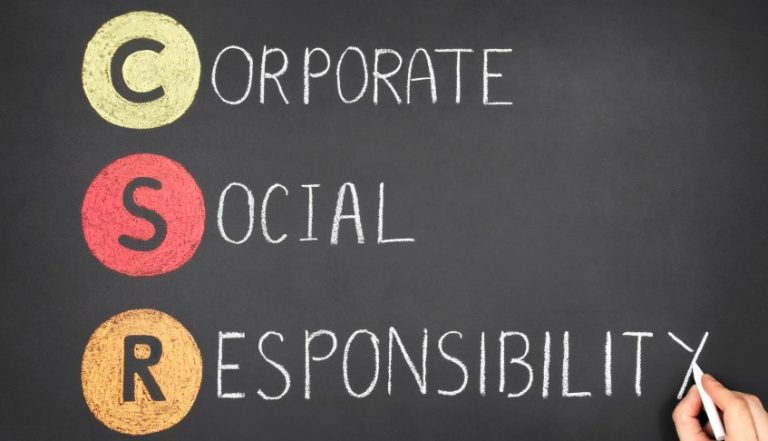Post Contents
Until recently, most huge corporations were nearly entirely motivated by a single goal: profit. Profit maximisation was at the centre of every activity or effort undertaken. However, in recent decades, many corporate leaders have understood that businesses must do more than merely maximise profits for shareholders and executives. Instead, they have a social obligation to do what is best for people, the earth, and society, not just their enterprises.
As a result of this awareness, firms that identify as socially responsible have emerged. Some even have names or seals, such as B Corporations (B Corps), social purpose corporations (SPCs), and low-profit limited liability firms (L3Cs).
But what exactly is corporate social responsibility, and what shapes may it take?
What exactly is Corporate Social Responsibility?

Corporate social responsibility (CSR) refers to initiatives that firms use as part of corporate governance to guarantee that their activities are ethical and helpful to society.
CSR Categories
Although corporate social responsibility is a broad term that each company interprets and applies differently, the basic premise of CSR is to operate in an economically, socially, and ecologically sustainable way.
Corporate social responsibility projects are broadly classified as follows:
Environmental stewardship
Initiatives for environmental responsibility seek to minimise pollution and greenhouse gas emissions while promoting sustainable use of natural resources.
Responsibility for human rights
Initiatives for human rights responsibilities include offering fair labour practices (e.g., equal pay for equal work), fair trade practices, and opposing child labour.
Philanthropic accountability
Philanthropic responsibilities might include sponsoring educational programmes, supporting health initiatives, giving to charities, and assisting with community beautification projects.
Financial accountability

Economic responsibility projects include enhancing a company’s commercial operations while engaging in sustainable activities, such as employing a new manufacturing technique to reduce waste.
What Does Corporate Social Responsibility Mean?
Increase Employee Morale and Engagement
A socially responsible corporation may enhance employee engagement. More and more employees want to be a part of something bigger than their jobs. Instead of going into the workplace, working & earn money, going home, and repeating, they are a part of something more significant.
Some companies have specific CSR teams that concentrate on charity activities. Sports or sponsored activities, for example, may be organised to generate funds. The goal is to get workers interested and feel like they are contributing to society, but with their employer’s help.
Enhancement of Society
Most CSR is done via nonprofits, whether to help with physical labour or finance them. Charities including Cancer Research, the Salvation Army, and the Red Cross Foundation all profit from CSR.
As a result, such organisations obtain the funds they need to battle cancer, assist the homeless, and contribute to disaster relief. We also have certain firms that actively donate to charitable causes.
Image of the Brand
Corporate Social Responsibility may significantly impact a brand’s image and reputation. According to a survey by Edelman and Young & Rubicam, 87 per cent of UK customers want businesses to consider their social effect as much as their own, and more than 70 per cent of individuals make a point of purchasing from companies that share their values.

As a result, it is not only ethically desirable but may also benefit the company’s financial line. Customers more inclined to purchase at ethical businesses will do more business with them. Even if the prices are higher, increased demand might create a win-win situation.
Examples of Corporate Social Responsibility
Google’s Corporate Social Responsibility is extensive and diverse, ranging from sustainability to education to aid in discovering terrible illnesses. It has a lot of well-organised schemes, so we’ll look at some of the larger ones.
Disney
Disney is routinely recognised among the top firms in terms of CSR activity. Among its CSR goals are environmental sustainability, investment in youth education, volunteering, children’s hospitals, and wish giving.
Microsoft
Microsoft’s Corporate Social Responsibility dates back to 1983 when the company raised $17,000 for the community. Since then, it has extended its ‘Employee Giving Program,’ paying charity $25 each hour an employee volunteers for the cause.
Lego
The Lego Charity is a distinct foundation run by Lego. It is a corporate social responsibility leader, typically in the top five of yearly rankings.
The Lego Foundation gave $100 million to Sesame Workshop in 2018, nonprofit assisting young children impacted by the Rohingya refugee crisis in Bangladesh and the Syrian civil war.
Furthermore, the corporation spent more than $165 million to develop the first sustainable Lego block. Lego claims they are similar to the plastic ones since they are made of plant-based plastic derived from sugar cane. It is now collaborating with the World Wildlife Fund (WWF) to develop a more sustainable supply chain.
CSR’s Business Advantages Corporate social responsibility may be seen as a kind of public relations. However, it goes beyond that since corporate social responsibility may improve a company’s competitiveness.
The commercial advantages of corporate social responsibility

Improved brand awareness, recognition, and reputation
CSR helps to value a business by building and sustaining a positive company reputation and brand equity.
Improved client retention and sales
Customers feel they are helping a company do good by doing business with them because of the firm’s commitment to corporate social responsibility.
Cost reductions in operations
Investing in operational efficiency leads to lower operating costs and a lower environmental impact.
Keeping crucial and exceptional staff on board
Employees frequently remain longer and are more devoted to their company when they know they work for a company that implements CSR.
Easier financing access
Many investors are more ready to back a company that implements CSR.
Reduction in regulatory burden
Strong ties with regulatory organisations may aid in the reduction of a company’s regulatory burden.
Conclusion
CSR is a self-regulatory business plan that helps companies be socially accountable to themselves, their stakeholders, and the public. Companies that practise CSR may be mindful of their economic, social, and environmental impacts. CSR implies that a firm operates in ways that benefit society and the environment rather than harm them in the usual business.


